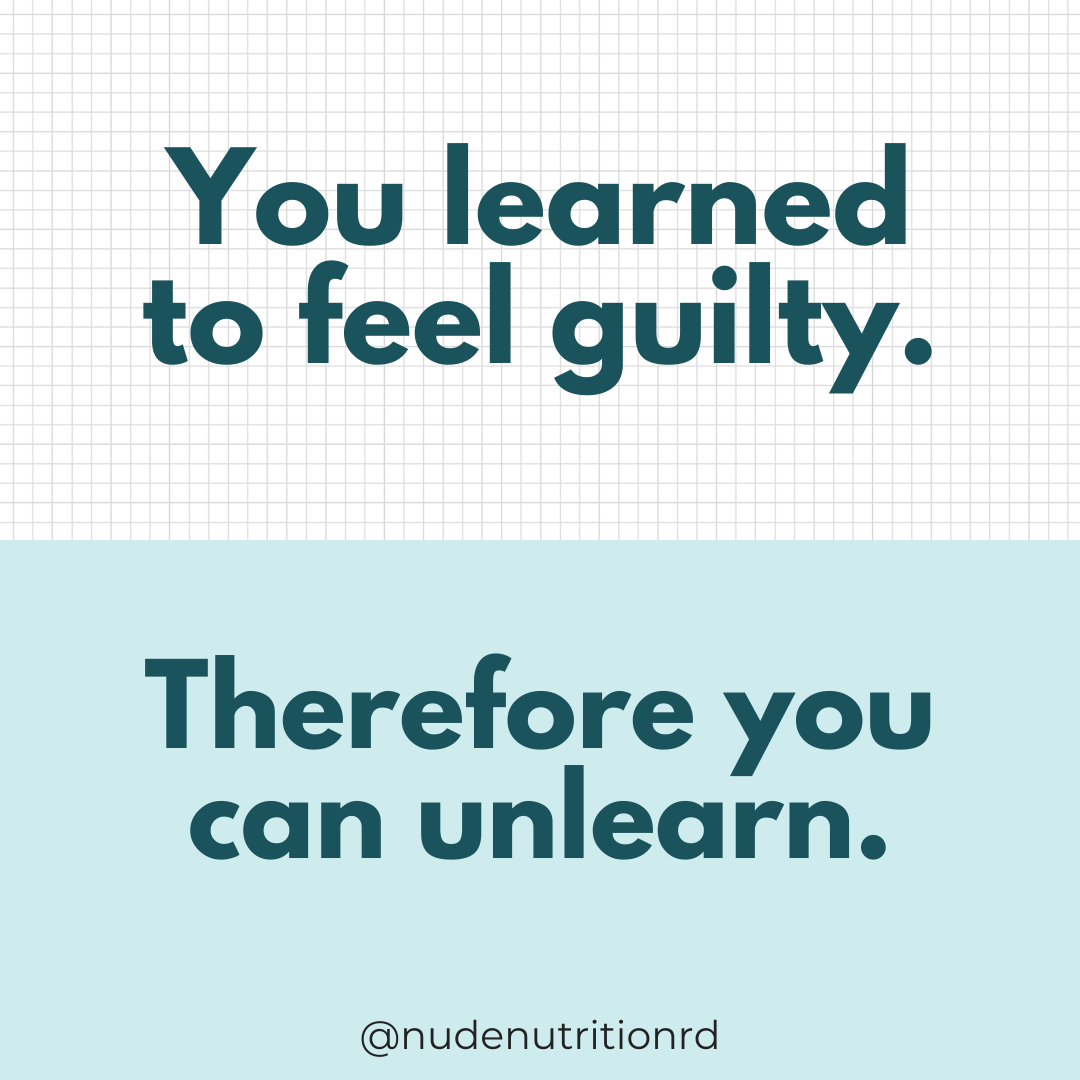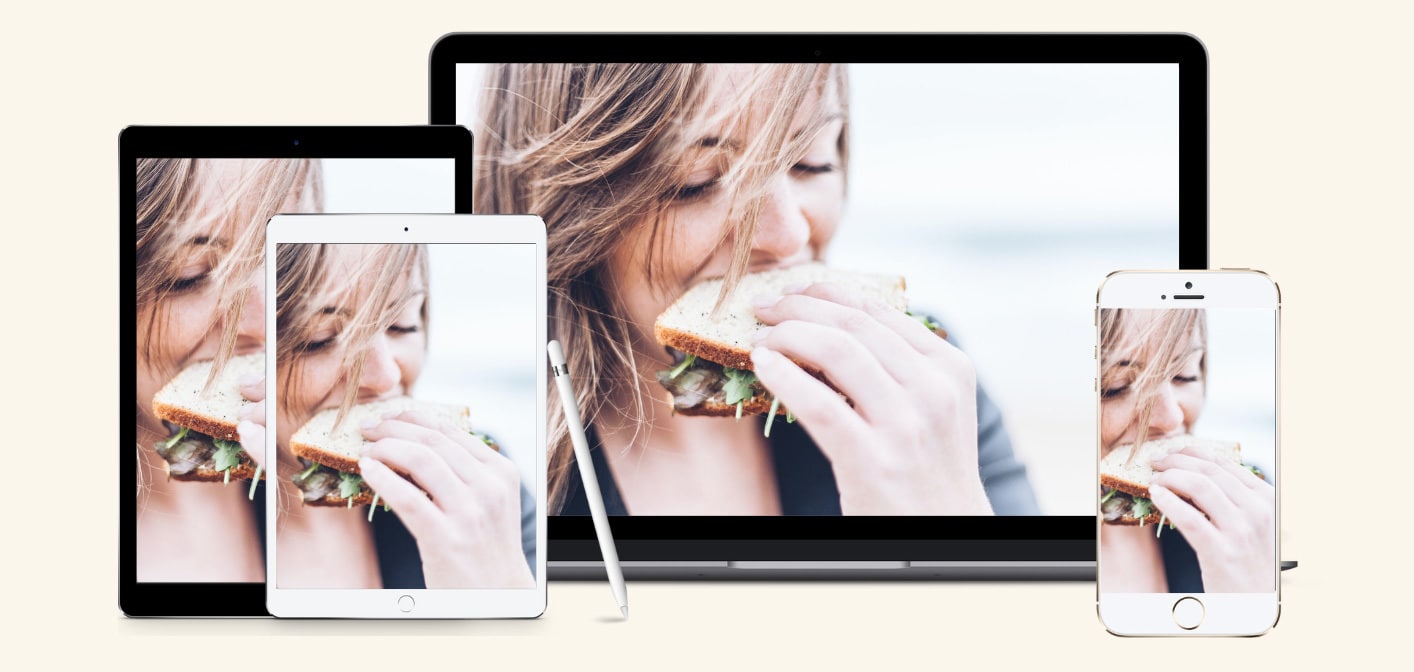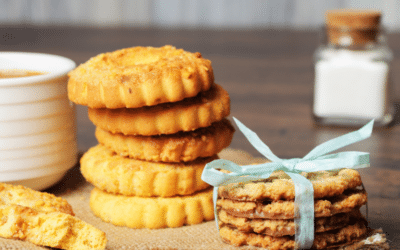Food Guilt: How To Get Rid of It
Food guilt is all too common and can steal the joy from the experience of eating. Not only that, it can take us away from experiencing our own bodies and identifying what feels good for us in the moment.
Does this sound familiar?
“I find myself obsessing over food, which results in overeating “pleasure” food such as chocolates when I am not even hungry and then feeling guilty.”
Because after all, you’re the best too to decide what, when and how much your body needs.
Not the food police.
In this article, I’m going to dive into what food guilt is, and strategies to get rid of it so that you can have a more peaceful relationship with food.
FREE Guide: 5 Inspiring People To Follow Who Won’t Induce Food Guilt
Before we dive in, let’s look at what “food guilt” really means.
As per the English dictionary, guilt is defined as:
“noun. the fact or state of having committed an offence, crime, violation, or wrong, especially against moral or penal law; culpability: He admitted his guilt. a feeling of responsibility or remorse for some offence, crime, wrong, etc., whether real or imagined.”
So the reason we can feel food guilt is the sense of having “broken” something, or having committed a crime.
Are you really committing a crime by simply eating food?
Let’s look at an example:
“I find myself obsessing over food, which results in overeating “pleasure” food such as chocolates when I am not even hungry and then feeling guilty.”
In the case above the felt crime committed is:
- “eating when not hungry”.
This person is experiencing food guilt because they have broken a perceived rule.
Is this the reason you’re feeling food guilt too?
You might be thinking:
“but if I didn’t have rules or guidelines, how would I know how to eat healthily?”
I hear you. And I am answering this question below.
The problem is, these rules can be so deeply ingrained in our psyche that we just can’t spot them. And therefore, it can feel difficult to move away from feeling guilty.
But remember.
You LEARNED to feel food guilt.
Therefore you can unlearn it.
FREE Guide: 5 Inspiring People To Follow Who Won't Induce Food Guilt
But surely we need rules to ensure we eat healthily?
It’s important to note that health isn’t’ just about what we eat. It’s about having a healthy relationship with food too. So if we’re riddled with food guilt after eating certain foods, stress levels are going to be high, which isn’t going to be healthy either.
Of course, it makes sense to have guidelines to provide some gentle education around nutrition.
However, diet culture* does more than this. It imposes quite rigid rules and ideas about what, when and how much we “should” eat. This can make us feel like we’re addicted to foods like sugar. No matter how well-meaning, it can actually do more harm than good for a lot of people. And it’s totally possible to not quit sugar and still be healthy!
The problem with rules:
- They can induce rebellion eating: This is the voice that comes in when you break a rule. The voice that says “you can’t tell me what to eat” or “I can so I will” voice. It’s usually not attuned to hunger and fullness and is quite intense, rebellious and not satisfying. Because it’s usually about making a statement.
- Can result in the sod it mentality: When you have more than 2 squares of chocolate and think “sod it, that’s me ruined for the day”. Dieters tend to evaluate their successes or failures of eating in terms of the current day. Even just thinking that you have violated a food rule is enough to trigger eating more, regardless of hunger or fullness levels.
- Can be inflexible and don’t account for varying needs of the body: Just like our emotional needs very day to day, our hunger levels, and what brings us joy, pleasure does too. There is no such thing as perfect.
- The irony of thought suppression: Don’t think of a pink elephant…. did you think of a pink elephant right? This is exactly what happens when we try to not eat something because we’ve been told not to. A large body of research indicates that thought suppression is ineffective.
- The last supper effect: For many, just the anticipation of sticking to a new food rule is enough to trigger overeating. A study on chocolate lovers found that when the chocolate restriction was imposed for 3 weeks, it triggered an increase in the amount of chocolate eaten both before and after the restrictive period.
- The forbidden fruit effect: A large body of research on children has identified that when we tell them not to eat that specific food (red M&Ms for example), the red M&Ms received the most attention and consumption. The same goes when you tell the children not to eat fruit… This means it’s not just an effect that is related to high fat and high sugar foods. It’s the forbidden factor that drives the want to eat the food.
- Overeating: Restrained eaters are more likely to overeat at just the perceptions of breaking a food rule. Studies have identified that the mere perception of blowing rule was enough to result in eating past comfortable fullness.
(*Diet culture is a system of beliefs that worships thinness and equates it to health and moral virtue. This can make people spend a lot of their lives thinking they are irreparably broken just because you don’t look like the impossibly thin ideal.)
So How Do I Move Away From Food Guilt?
In short…
- Unlearning
- Re-learning why there is no reason to feel food guilt.
- Challenging
- Time
- Patience
- Self-compassion
- Repeat
Once again.
You LEARNED to feel food guilt.
Therefore you can unlearn it.
Intuitive Eating is an evidenced based framework designed to help people break out of a negative relationship with food. A key principle is challenging the food police!
ACTIVITY: Identifying your food rules
It’s impossible to know what you’re working with if you don’t know explicitly what the rules in your head are. Take some time to have a good think about what these are. I strongly encourage writing them down. There is something in the power of having these written down in front of you.
- Do you have rules around snacking?
- What about what time of day is okay to eat?
- Do you look at calories to determine what to eat?
- What about rules around drinks?
- Are there any foods you try to avoid?
Challenging food rules can help to remove food guilt
Follower concern: “I followed the slimming world plan on and off for a long time – never really getting anywhere- but it’s kinda stuck in my head. I can have days where I feel guilty for eating bad or foods not considered okay on Slimming World, and just go down a rabbit hole of continuing to eat badly because what’s the point”
The only real way to move away from food guilt is to challenge the rules that have been picked up along the way. When you challenge them, you get to discover for yourself, what feels good for you. Rather than have someone decide this for you. Because ultimately, all food should be guilt free.
Start with a rule that feels the least scary. Take a look at where this rule came from. Is it backed up by science? Or is it something that came from a personal trainer unqualified to provide nutrition advice back in the day and has just not left you?
Example:
Rule: “Carbs are bad. I should not have them past 12pm even if I crave them”
Questions to ask yourself:
- Should I really never eat carbs past 12pm?
- Aren’t there times in the day when I do in fact eat a lot of carbs?
- How do I feel when I don’t eat carbohydrates in the day?
Reframe the thought:
- “My past experiences demonstrate that when I try not to eat carbs past 12pm, I have little energy and find myself eating a lot of carbs at night anyway.”
Reflection after challenging the rule:
- “My past experience demonstrates that when I add carbs to my meals throughout the day and in the afternoons, I feel more in control around my eating in the evening.”
What if I feel out of control?
Follower concern: “I find that the biggest challenge is the guilt and shame that follows a binge. It’s hard to not fixate on what just happened and to move on.”
A natural response to deprivation and restriction is to feel out of control. And that’s why it’s important to go into this with a safety blanket on.
The safety blanket is full of:
- A ton of self-compassion
- Rest and sleep
- Not being too hungry when challenging yourself – the primal drive to eat can take over and result in feeling more out of control
- Be in a safe environment – whether this is at home, on your own, at work, with loved ones. Whatever feels right for you.
It can take time to challenge food rules, and it’s expected that your brain may have conflicting messages. You might have a diet brain on the one side telling you to restrict and stick to the rules, whilst you’re trying to challenge them at the same time!
The more you challenge the rules that aren’t serving you, the more the judgmental thoughts will dissipate over time. This takes time and patience.
If you’re feeling like this is too much on your own, or you think you have an eating disorder, it’s important to seek support from a qualified professional. You can also read more on “how to have better self-control around food“.
To summarise
We’ve learnt that food guilt can be caused by the felt sense of breaking a rule. Whilst some gentle education around nutrition can be helpful, diet culture often inflicts more rigid and inflexible rules. These rules can consume our thoughts, and result in a backlash effect of rebellion eating and feeling out of control.
The positive thing is, you’ve learned these thoughts. So you can unlearn them! And when you’re clear on what these rules are, you can start to challenge them, one by one. With this, a safety blanket of compassion, time and patience is required. But you can do this, I know you can! And if you’re stuck, it might be worth investing in some professional support to help you navigate through.
I’m rooting for you!
Kat
x
FREE Guide: 5 Inspiring People To Follow Who Won't Induce Food Guilt





